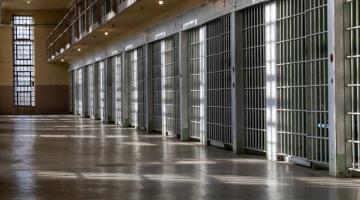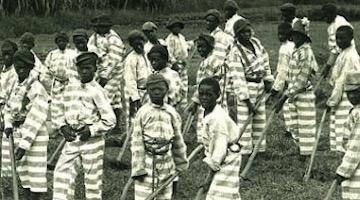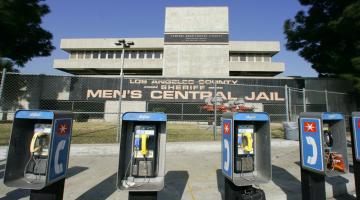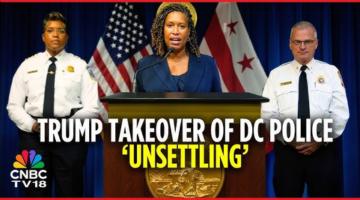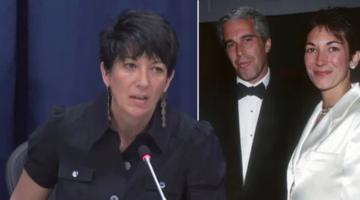Yes, Trump is an inveterate liar, but American politicians have always told lies about the Black and brown people they demonize and mass-imprison.
“Highly racialized and punitive systems thrived under liberal presidents who were given the benefit of the doubt by those who might otherwise have been critics.
Ten years have passed since my book, "The New Jim Crow," was published. I wrote it to challenge our nation to reckon with the recurring cycles of racial reform, retrenchment and rebirth of caste-like systems that have defined our racial history since slavery. It has been an astonishing decade. Everything and nothing has changed.
When I was researching and writing the book, Barack Obama had not yet been elected president of the United States. I was in disbelief that our country would actually elect a black man to be the leader of the so-called free world. As the election approached, I felt an odd sense of hope and dread. I hoped against all reason that we would actually do it. But I also knew that, if we did, there would be a price to pay.
Everything I knew through experience and study told me that we as a nation did not fully understand the nature of the moment we were in. We had recently birthed another caste system -- a system of mass incarceration -- that locked millions of poor people and people of color in literal and virtual cages.
Our nation's prison and jail population had quintupled in 30 years, leaving us with the highest incarceration rate in the world. A third of black men had felony records -- due in large part to a racially biased, brutal drug war -- and were relegated to a permanent second-class status. Tens of millions of people in the United States had been stripped of basic civil and human rights, including the right to vote, the right to serve on juries and the right to be free of legal discrimination in employment, housing, education and basic public benefits.
“Tens of millions of people in the United States had been stripped of basic civil and human rights.”
Nevertheless, our nation remained in deep denial that a new caste system even existed, and most of us -- even those who cared deeply about racial justice -- did not seem to understand that powerful racial dynamics and political forces were at play that made much of our racial progress illusory. We had not faced our racial history and could not tell the truth about our racial present, yet growing numbers of Americans wanted to elect a black president and leap into a "colorblind" future.
I was right to worry about the aftermath of Obama's election. After he was inaugurated, our nation was awash in "post-racialism." Black History Month events revolved around "how far we've come." Many in the black community and beyond felt that, if Obama could win the presidency, anything was possible. Few people wanted to hear the message I felt desperate to convey: Despite appearances, our nation remains trapped in a cycle of racial reform, backlash and re-formation of systems of racial and social control.
Things have changed since then. Donald Trump is president of the United States. For many, this feels like whiplash. After eight years of Barack Obama -- a man who embraced the rhetoric (though not the politics) of the civil rights movement -- we now have a president who embraces the rhetoric and the politics of white nationalism. This is a president who openly stokes racial animosity and even racial violence, who praises dictators (and likely aspires to be one), who behaves like a petulant toddler on Twitter, and who has a passionate, devoted following of millions of people who proudly say they want to "make America great again" by taking us back to a time that we've left behind.
“We now have a president who embraces the rhetoric and the politics of white nationalism.”
We are now living in an era not of post-racialism but of unabashed racialism, a time when many white Americans feel free to speak openly of their nostalgia for an age when their cultural, political and economic dominance could be taken for granted -- no apologies required. Racial bigotry, fearmongering and scapegoating are no longer subterranean in our political discourse; the dog whistles have been replaced by bullhorns. White nationalist movements are operating openly online and in many of our communities; they're celebrating mass killings and recruiting thousands into their ranks.
White nationalism has been emboldened by our president, who routinely unleashes hostile tirades against black and brown people - calling Mexican migrants criminals, "rapists" and "bad people," referring to developing African nations as "shithole countries" and smearing a district of the majority-black city of Baltimore as a "disgusting, rat and rodent infested mess." Millions of Americans are cheering, or at least tolerating, these racial hostilities.
Contrary to what many people would have us believe, what our nation is experiencing is not an "aberration." The politics of "Trumpism" and "fake news" are not new; they are as old as the nation itself. The very same playbook has been used over and over in this country by those who seek to preserve racial hierarchy, or to exploit racial resentments and anxieties for political gain, each time with similar results.
“Many white Americans feel free to speak openly of their nostalgia for an age when their cultural, political and economic dominance could be taken for granted.”
Back in the 1980s and '90s, Democratic and Republican politicians leaned heavily on the racial stereotypes of "crack heads," "crack babies," "superpredators" and "welfare queens" to mobilize public support for the War on Drugs, a get-tough movement and a prison-building boom -- a political strategy that was traceable in large part to the desire to appeal to poor and working-class white voters who had defected from the Democratic Party in the wake of the civil rights movement.
Today, the rhetoric has changed, but the game remains the same. Public enemy No. 1 in the 2016 election was a brown-skinned immigrant, an "illegal," a "terrorist" or an influx of people who want to take your job or rape your daughter. As Trump put it: "When Mexico sends its people, they're not sending their best. . They're sending people that have lots of problems, and they're bringing those problems. . They're bringing drugs. They're bringing crime. They're rapists."
He promised to solve this imaginary crisis through mass deportation and building a wall between the United States and Mexico. He also insisted that his political opponent, Hillary Clinton, wanted "millions of illegal immigrants to come in and take everybody's jobs." And he blamed domestic terroristic attacks in New Jersey and New York on "our extremely open immigration system," which, he argued, allows Muslim terrorists into our country.
The fact that Trump's claims were demonstrably false did not impede his rise, just as facts were largely irrelevant at the outset of the War on Drugs. It didn't matter back then that studies consistently found that whites were equally likely, if not more likely, than people of color to use and sell illegal drugs. Black people were still labeled the enemy. Nor did it matter, when the drug war was taking off, that nearly all of the sensationalized claims that crack cocaine was some kind of "demon drug," drastically more harmful than powder cocaine, were false or misleading. Black people charged with possession of crack in inner cities were still punished far more harshly than white people in possession of powder cocaine in the suburbs. And it didn't matter that African-Americans weren't actually taking white people's jobs or college educations in significant numbers through affirmative action programs.
“Democratic and Republican politicians leaned heavily on the racial stereotypes.”
Getting tough on "them" -- the racially defined "others" who could easily be used as scapegoats and cast as the enemy -- was all that mattered. Facts were treated as largely irrelevant then. As they are now.
Fortunately, a growing number of scholars and activists have begun to connect the dots between mass incarceration and mass deportation in our nation's history and current politics. The historian Kelly Lytle Hernández, in her essay "Amnesty or Abolition: Felons, Illegals, and the Case for a New Abolition Movement," chronicles how these systems have emerged as interlocking forms of social control that relegate "aliens" and "felons" to a racialized caste of outsiders. In recent decades, the system of mass incarceration has stripped away from millions of U.S. citizens basic civil and human rights until their status mirrors (or dips below) that of noncitizen immigrants within the United States. This development has coincided with the criminalization of immigration in the United States, resulting in a new class of "illegal immigrants" and "aliens" who are viewed and treated like "felons" or "criminals." Immigration violations that were once treated as minor civil infractions are now crimes. And minor legal infractions, ranging from shoplifting to marijuana possession to traffic violations, now routinely prompt one of the nation's most devastating sanctions -- deportation.
The story of how our "nation of immigrants" came to deport and incarcerate so many for so little, Hernández explains, is a story of race and unfreedom reaching back to the era of emancipation. If we fail to understand the historical relationship between these systems, especially the racial politics that enabled them, we will be unable to build a truly united front that will prevent the continual re-formation of systems of racial and social control.
“A story of race and unfreedom reaching back to the era of emancipation.”
In my experience, those who argue that the systems of mass incarceration and mass deportation simply reflect sincere (but misguided) efforts to address the real harms caused by crime, or the real challenges created by surges in immigration, tend to underestimate the corrupting influence of white supremacy whenever black and brown people are perceived to be the problem. "Between me and the other world, there is ever an unasked question," W.E.B. Du Bois famously said back in 1897: "How does it feel to be a problem?" White people are generally allowed to have problems, and they've historically been granted the power to define and respond to them. But people of color -- in this "land of the free" forged through slavery and genocide -- are regularly viewed and treated as the problem.
This distinction has made all the difference. Once human beings are defined as the problem in the public consciousness, their elimination through deportation, incarceration or even genocide becomes nearly inevitable.
White nationalism, at its core, reflects a belief that our nation's problems would be solved if only people of color could somehow be gotten rid of, or at least better controlled. In short, mass incarceration and mass deportation have less to do with crime and immigration than the ways we've chosen to respond to those issues when black and brown people are framed as the problem.
As Khalil Gibran Muhammad points out in "The Condemnation of Blackness," throughout our nation's history, when crime and immigration have been perceived as white, our nation's response has been radically different from when those phenomena have been defined as black or brown. The systems of mass incarceration and mass deportation may seem entirely unrelated at first glance, but they are both deeply rooted in our racial history, and they both have expanded in part because of the enormous profits to be made in controlling, exploiting and eliminating vulnerable human beings.
“Once human beings are defined as the problem in the public consciousness, their elimination through deportation, incarceration or even genocide becomes nearly inevitable.”
It is tempting to imagine that electing a Democratic president or more Democratic politicians will fix the crises in our justice systems and our democracy. To be clear, removing Trump from office is necessary and urgent; but simply electing more Democrats to office is no guarantee that our nation will break its habit of birthing enormous systems of racial and social control. Indeed, one of the lessons of recent decades is these systems can grow and thrive even when our elected leaders claim to be progressive and espouse the rhetoric of equality, inclusion and civil rights.
President Bill Clinton, who publicly aligned himself with the black community and black leaders, escalated a racially discriminatory drug war in part to avoid being cast by conservatives as "soft on crime." Similarly, President Obama publicly preached values of inclusion and compassion toward immigrants, yet he escalated the mass detention and deportation of noncitizens.
Obama claimed that his administration was focused on deporting: "Felons, not families. Criminals, not children. Gang members, not a mom who's working hard to provide for her kids." However, reports by The New York Times and the Marshall Project revealed that, despite Obama's rhetoric, a clear majority of immigrants detained and deported during his administration had no criminal records, except minor infractions, including traffic violations, and posed no threat.
Equally important is the reality that "felons" have families. And "criminals" are often children or teenagers. The notion that, if you've ever committed a crime, you're permanently disposable is the very idea that has rationalized mass incarceration in the United States.
“A clear majority of immigrants detained and deported during Obama’s administration had no criminal records.”
None of this is to minimize the real progress that has occurred on many issues of race and criminal justice during the past decade. Today, there is bipartisan support for some prison downsizing, and hundreds of millions of philanthropic dollars have begun to flow toward criminal justice reform. A vibrant movement led by formerly incarcerated and convicted people is on the rise - a movement that has challenged or repealed disenfranchisement laws in several states, mobilized support of sentencing reform and successfully organized to "ban the box" on employment applications that discriminate against those with criminal records by asking the dreaded question: "Have you ever been convicted of a felony?"
Activism challenging police violence has swept the nation - inspired by the courageous uprisings in Ferguson, Mo., the viral videos of police killings of unarmed black people, and #BlackLivesMatter. Promising movements for restorative and transformative justice have taken hold in numerous cities. Campaigns against cash bail have gained steam. Marijuana legalization has sped across the nation, with more than 25 states having partly or fully decriminalized cannabis since 2012.
And "The New Jim Crow," which some predicted would never get an audience, wound up spending nearly 250 weeks on the New York Times best-seller list and has been used widely by faith groups, activists, educators and people directly affected by mass incarceration inside and outside prisons. Over the past 10 years, I've received thousands of letters -- and tens of thousands of emails -- from people in all walks of life who have written to share how the book changed their lives or how they have used it to support consciousness-raising or activism in countless ways.
“A vibrant movement led by formerly incarcerated and convicted people is on the rise.”
Everything has changed. And yet nothing has.
The politics of white supremacy, which defined our original constitution, have continued unabated -- repeatedly and predictably engendering new systems of racial and social control. Just a few decades ago, politicians vowed to build more prison walls. Today, they promise border walls.
The political strategy of divide, demonize and conquer has worked for centuries in the United States -- since the days of slavery -- to keep poor and working people angry at (and fearful of) one another rather than uniting to challenge unjust political and economic systems. At times, the tactics of white supremacy have led to open warfare. Other times, the divisions and conflicts are less visible, lurking beneath the surface.
The stakes now are as high as they've ever been. Nearly everyone seems aware that our democracy is in crisis, yet few seem prepared to reckon with the reality that removing Trump from office will not rid our nation of the social and political dynamics that made his election possible. No issue has proved more vexing to this nation than the issue of race, and yet no question is more pressing than how to overcome the politics of white supremacy -- a form of politics that not only led to an actual civil war but that threatens our ability ever to create a truly fair, just and inclusive democracy.
We find ourselves in this dangerous place not because something radically different has occurred in our nation's politics, but because so much has remained the same.
The inconvenient truth is that racial progress in this country is always more complex and frequently more illusory than it appears at first glance. The past 10 years has been a case in point. Our nation has swung sharply from what Marc Mauer memorably termed "a race to incarcerate" -- propelled by bipartisan wars on "drugs" and "crime" -- to a bipartisan commitment to criminal justice reform, particularly in the area of drug policy. And yet, it must be acknowledged that much of the progress occurred not because of newfound concern for people of color who have been the primary targets of the drug war, but because drug addiction, due to the opioid crisis, became perceived as a white problem, and wealthy white investors became interested in profiting from the emerging legal cannabis industry.
“Much of the progress occurred because drug addiction became perceived as a white problem.”
Some of the reversals in political opinion have been striking. For example, John Boehner, a former Republican speaker of the House of Representatives, stated in 2011 that he was "unalterably opposed to decriminalizing marijuana," but by the spring of 2018 he had joined the board of a cannabis company.
Growing sympathy for illegal drug users among whites and conservatives, and concern regarding the expense of mass imprisonment, helped to make possible a bipartisan consensus in support of the Trump administration's First Step Act -- leading to the early release of more than 3,000 people from federal prisons for drug offenses. This development, which benefits people of color subject to harsh and biased drug sentencing laws, is difficult to characterize as major progress toward ending mass incarceration, given that Trump continued to unleash racially hostile tirades against communities of color and his administration vowed to reinstate the federal death penalty. He also rescinded a number of significant reforms adopted by Obama and expanded the use of private prisons.
Obama also has a complicated legacy with respect to criminal justice reform. Obama was the first sitting president to visit a federal correctional facility, the first to oversee a drop in the federal prison population in more than 30 years, and he granted clemency to nearly 2,000 people behind bars - the highest total for any president since Harry Truman. His administration enacted significant policy changes, including legislation reducing sentencing disparities involving crack and powder cocaine, a phasing out of federal contracts with private prisons, and limitations on the transfer of military equipment to local police departments.
And yet it sometimes appeared that Obama was reluctant to acknowledge the depth and breadth of the structural changes required to address police violence and the prevailing systems of racial and social control.
For example, when black Harvard professor Henry Louis Gates Jr. was arrested in his own home for no reason, Obama responded to the national furor and media frenzy by inviting Gates and the arresting officer to a "beer summit" at the White House to work things out over drinks and peanuts, as though racial profiling is little more than an interpersonal dispute that can be resolved through friendly dialogue.
“Trump vowed to reinstate the federal death penalty.”
Most troubling, the modest criminal justice reforms that were achieved during the Obama administration coincided with the expansion of the system of mass deportation. Although the administration agreed to phase out federal contracts for private prisons, it made enormous investments in private detention centers for immigrants, including the granting of a $1 billion contract to Corrections Corporation of America, the nation's largest prison company, to build a detention facility for women and children asylum seekers from Central America.
Immigrant detention centers were exempted from the phaseout plan for private prisons, which meant that only about a quarter of the population held in private facilities in the United States was affected by the plan. The caging of immigrants for profit was allowed to continue without restraint.
The reality is that, during both the Obama and Clinton years, highly racialized and punitive systems thrived under liberal presidents who were given the benefit of the doubt by those who might otherwise have been critics. Obama and Clinton's public displays of affection for communities of color, the egalitarian values they preached and their liberal or progressive stances on other issues helped to shield these vast systems of control from close scrutiny.
Many of us saw these presidents as "good people" with our best interests at heart, doing what they could to navigate a political environment in which only limited justice is possible. All of these factors played a role, but one was key: These systems grew with relatively little political resistance because people of all colors were willing to tolerate the disposal of millions of individuals once they had been labeled criminals in the media and political discourse. This painful reality suggests that ending our nation's habit of creating enormous systems of racial and social control requires us to expand our sphere of moral concern so widely that none of us, not even those branded criminals, can be viewed or treated as disposable.
If there is any silver lining to be found in the election of Donald Trump to the presidency, it is that millions of people have been inspired to demonstrate solidarity on a large scale across the lines of gender, race, religion and class in defense of those who have been demonized and targeted for elimination. Trump's blatant racial demagogy has awakened many from their "colorblind" slumber and spurred collective action to oppose the Muslim ban and the border wall, and to create sanctuaries for immigrants in their places of worship and local communities.
Many who are engaged in this work are also deeply involved in, or supportive of, movements to end police violence and mass incarceration. Growing numbers of people are beginning to see how the politics of white supremacy have resurfaced again and again, leading to the creation and maintenance of new systems of racial and social control. A politics of deep solidarity is beginning to emerge -- the only form of politics that holds any hope for our collective liberation.
The centuries-long struggle to birth a truly inclusive, egalitarian democracy -- a nation in which every voice and every life truly matters -- did not begin with us, and it will not end with us. The struggle is as old as the nation itself and the birth process has been painful, to say the least. My greatest hope and prayer is that we will serve as faithful midwives in our lifetimes and do what we can to make America, finally, what it must become.
Michelle Alexander is a civil rights lawyer and advocate, legal scholar and author of the 10th anniversary edition of "The New Jim Crow: Mass Incarceration in the Age of Colorblindness," from which this essay is adapted.
This article previously appeared in The New York Times.
COMMENTS?
Please join the conversation on Black Agenda Report's Facebook page at http://facebook.com/blackagendareport
Or, you can comment by emailing us at comments@blackagendareport.com

